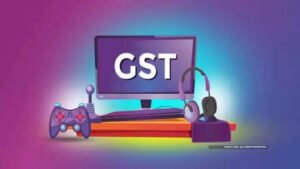
The rapidly expanding digital gaming industry in India has attracted significant investment and remained at the forefront of technical advancement and entertainment. However, a recent turn of events—the imposition of a 28% Goods and Services Tax (GST) applicable to online gaming—has caused seismic tremors throughout this space. This historic fiscal increase, which took effect on October 1st, 2023, has sparked intense debates over its possible effects on the growth of the gaming sector, potential worker cutbacks, and the viability of start-up gaming businesses.
The Taxation Policy That’s Causing a Stir
Industry experts and gaming fans have kept a close eye on the decision to tax online gaming at a rate of 28%. Detractors assert that this tax imposition may well impede the gaming industry’s growing trajectory, a sector that has been really working to establish its place as a global leader. This tariff, which the Goods and Services Tax Council published in July, covers a wide range of online gaming platforms, including skill-based competitions, fantasy sports, and casino games. The effects on the business are wide-ranging, giving rise to worries about anything from shrinking prize pools to the possibility of job cuts.
Immediate Effects on Online Gaming
The introduction of GST has prompted a considerable upheaval in the dynamic world of online gaming, notably in the area of real-money gaming firms. This innovative fiscal structure, which entails a high 28% tax on the total value of transactions within the online gaming business, is expected to have a significant effect on the direction of the sector. It’s not just a taxing system; it’s a tectonic change that has led business experts to call it a “substantial setback” for the industry as a whole. This seismic shift might make it difficult for new firms to enter the market.
One of the many immediate effects of this historic choice sticks out particularly: the probable decline in India’s gaming population. The tax burden may result in a discernible decline in the gaming community’s ranks, which now numbers an amazing 120 million fans. According to the astute minds at The Hindu Business Line, this might then pave the way for a wave of sector mergers as smaller industries struggle with the existential issue offered by this unexpected financial burden.
For online gambling enterprises, the paradigm shift brought about by the application of GST signals a period of reflection and adjustment. It represents a turning point when creativity and resilience will be crucial and where the peaceful coexistence of variety and uniformity will determine the future boundaries of this constantly changing digital space.
The Burden of Taxation on Gamers
game enthusiasts are at a financial crossroads with potential consequences that extend well beyond their game screens. A figurative hornet’s nest has been stirred by the implementation of a 28% Goods and Services Tax (GST) in the online gaming industry, possibly changing the very terrain these gamers traverse. The All-India Gaming Federation, in particular, claims that this tax levy bears a significant burden and casts a dark financial shad

ow on players.
In a shocking turn of events, this taxation is not just linked to the entry fee for these online venues of competition. It expands its reach to include players’ actual gains, taxing them on their gross income rather than the more common standard of net profits. For those shrewd players who participate in competitive showdowns of ability and strategy, such an extraordinary fiscal policy change might have far-reaching effects.
The effects of this tax adjustment are startling, according to a Forbes India analysis. They forecast a concerning 1100% increase in the GST cost incurred by these ardent players. The financial elements of online gaming will need to be re-evaluated in light of this seismic upheaval in the economic environment, which will force gamers to dig even deeper into their wallets to enjoy their most treasured virtual adventures.
The Industry’s Response
Gaming Industry Response The gambling sector is raising concerns about the possible effects of recent tax reform in India, a developing hub for entrepreneurs and international financial investments. Online gaming has been a key driver of economic growth, but the sudden implementation of a 28% Goods and Services Tax (GST) has shocked industry stakeholders.
A wave of industry consolidation may be sparked by the application of this 28% GST on online gaming sites, according to respected specialists in the area. Smaller businesses in the industry could be compelled to merge with bigger companies or, more sadly, shut down completely, which would result in a cascade of job losses. Industry leaders have nicknamed this tax increase a “coup de grâce,” according to CNBCTV18, and they worry that it might lead to the closure of several businesses and a sizable reduction in employment.
Concerns about Foreign Investment and Growth
The Goods and Services Tax (GST)’s adoption in the online gaming industry has wide-ranging effects, impacting not just local players but also attracting the interest of global investors and fans. Due to this tendency, India might become the center of the global gaming industry. However, experts and analysts voice concerns about the excessive tax rate, worried that it would scare away foreign funders and impede the sector’s development. The fundamental worry centers on the possible roadblocks it would put in the way of India’s desire to become a well-known global gaming hub, as The Hindu has noted.
Esports and Its Taxation
It is critical to recognize that the introduction of a 28% Goods and Services Tax (GST) on the online gaming sector has raised a lot of concerns. It is crucial to stress that not all areas of the gaming industry may see the same effects of these taxes. Notably, the esports industry serves as a perfect example since, according to Business Standard, it may not be exposed to the same negative effects brought about by this fiscal action. Esports is positioned to get a different treatment under the scope of this tax system due to its unique classification and intrinsic character, perhaps saving it from the same level of fiscal imposition as its online gaming peers.
The Road Ahead for the Gaming Industry

The gaming industry in India is at a turning point after an incredible expansion and growth journey. But a crucial turning point has been reached with the introduction of a 28% Goods and Services Tax (GST) on online gambling, bringing with it a number of difficulties and concerns. The gaming industry is currently faced with important issues related to its future, potential labor disruptions, and the implications for developing game businesses. At the same time, obstacles may stand in the way of its efforts to attract foreign investment and establish a global presence.
Stakeholders are closely watching legislators for any potential adjustments or allowances that might sustain and further energize this vibrant industry as it navigates this unfamiliar fiscal landscape. The future of online gaming, intertwined with the far-reaching effects of the 28% GST, will undoubtedly remain an engaging and heavily studied story for the foreseeable future in a country where the promise of digital technology and entertainment looms large









